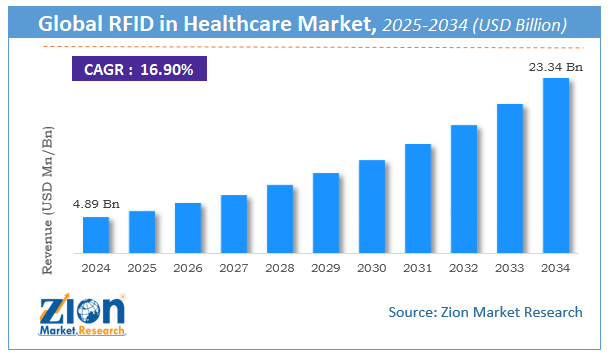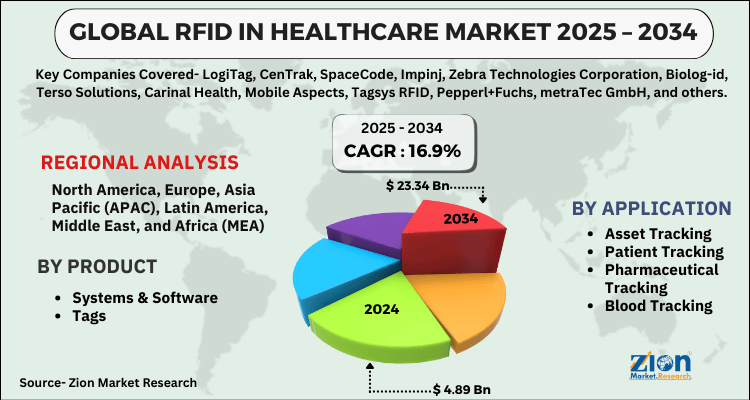Global RFID in Healthcare Market Size, Share, Growth Analysis Report - Forecast 2034

RFID in Healthcare Market By Product (Systems & Software, Tags), By Application (Asset Tracking, Patient Tracking, Pharmaceutical Tracking, Blood Tracking, Others), and By Region: Global and Regional Industry Overview, Market Intelligence, Comprehensive Analysis, Historical Data, and Forecasts 2025 - 2034
| Market Size in 2024 | Market Forecast in 2034 | CAGR (in %) | Base Year |
|---|---|---|---|
| USD 4.89 Billion | USD 23.34 Billion | 16.9% | 2024 |
RFID in Healthcare Market Size
The global RFID in healthcare market size was worth around USD 4.89 Billion in 2024 and is predicted to grow to around USD 23.34 Billion by 2034 with a compound annual growth rate (CAGR) of roughly 16.9% between 2025 and 2034.
The report analyzes the global RFID in healthcare market's drivers, restraints/challenges, and the effect they have on the demands during the projection period. In addition, the report explores emerging opportunities in the RFID in healthcare industry.
RFID in Healthcare Market: Overview
Technological proliferation in all walks of life has increased significantly and this trend is also expected to have an impact on the healthcare industry. RFID in healthcare has emerged as a popular trend and is anticipated to have a bright scope of the application over the forecast period.
The healthcare industry has seen some major changes in recent years and technology has become a crucial aspect of the industry. RFID technology has seen an increase in adoption in the healthcare industry and is proving to be a major hit in reducing the overall cost of healthcare infrastructure by offering effective management opportunities. Increasing use of technology in healthcare has substantially reduced the errors and this is a major factor that will guide growth for not only RFID in healthcare market but for other useful healthcare technologies over the forecast period.
However, high costs associated with the RFID in healthcare implementation and deployment are expected to constrain RFID in healthcare market growth through 2028.
The RFID technology has the capability to save money and time of the healthcare organizations. The ability of RFID in providing real-time identification, traceability, communication, location, and temperature data for individuals and resources can be very beneficial. The implementation of RFID technology in hospitals and clinics can decrease inaccuracies in patient care, simplify patient and equipment tracking, enable better healthcare asset management, and improve audit processes.
Factors such as inventory management enhancement in pharmacies, hospitals, and biotech companies, high accuracy and low-cost of RFID systems, growing automation of processes in pharmacies and hospitals, increasing concern regarding drug safety, rising need for reduction of healthcare operational costs, need for prevention of medical device theft, multiple government initiatives, and wide application range of RFID in healthcare will act as driving factors in the growth of global RFID in healthcare market. Research activities are undertaken by not for profit organizations intended for the development of new and improved technologies and increasing adoption of RFID in healthcare will act as an opportunity for the market players in the RFID in healthcare market. However, the absence of awareness regarding RFID, lack of barcode systems, and absence of standardization will restrict the growth of global RFID in healthcare market.
Key Insights
- As per the analysis shared by our research analyst, the global RFID in healthcare market is estimated to grow annually at a CAGR of around 16.9% over the forecast period (2025-2034).
- Regarding revenue, the global RFID in healthcare market size was valued at around USD 4.89 Billion in 2024 and is projected to reach USD 23.34 Billion by 2034.
- The RFID in healthcare market is projected to grow at a significant rate due to rising need for efficient inventory management, patient tracking, and improved hospital workflow automation.
- Based on Product, the Systems & Software segment is expected to lead the global market.
- On the basis of Application, the Asset Tracking segment is growing at a high rate and will continue to dominate the global market.
- Based on region, North America is predicted to dominate the global market during the forecast period.
RFID in Healthcare Market: Growth Drivers
Improves operational Efficiency
RFID technology has proven its effectiveness in healthcare facility management and this is major propelling the RFID in healthcare market growth through 2028. RFID in healthcare has improved management of inventory, prevention of shortages, overstocking, counterfeiting, etc., and this has largely influenced operating costs of multiple healthcare institutions on a global scale and is expected to further bolster the demand for RFID in healthcare over the forecast period.
RFID in Healthcare Market: Restraints
High Cost of RFID Systems
RFID technology is relatively new in the market and is seeing rapid growth as well but the costs of implementing and deploying this technology are still relatively high and are not possible if the implementation is on a very advanced level for a huge institution. So the costs of the technology are expected to hinder RFID in healthcare market growth in the forecast period. RFID tags with advanced features are more expensive than regular ones and the more feature-heavy tag you opt for the more cost it incurs.
RFID technology providers could solve this problem by developing cost-efficient solutions and components that are easier to access and install for all healthcare institutions.
RFID in Healthcare Market: Segmentation Analysis
The global RFID in healthcare market is segregated based on product type, application, and region.
By Product Type, the market is divided into systems & software, and tags. Tags segment holds a dominant outlook as it is the most fundamental part of the RFID technology and is required in quantity for the systems to function efficiently. Increasing awareness about the efficiency of this technology is expected to further boost the demand for tags through 2028.
By Application, the RFID in healthcare market is segmented into asset tracking, patient tracking, pharmaceutical tracking, blood tracking, and others. The pharmaceutical tracking segment holds a major market share and is expected to maintain a dominant outlook through 2028. Increasing adoption of RFID in healthcare to identify counterfeit drugs is the major factor favoring the growth of this segment and is expected to continue to do so throughout the forecast period.
RFID in Healthcare Market: Report Scope
| Report Attributes | Report Details |
|---|---|
| Report Name | RFID in Healthcare Market |
| Market Size in 2024 | USD 4.89 Billion |
| Market Forecast in 2034 | USD 23.34 Billion |
| Growth Rate | CAGR of 16.9% |
| Number of Pages | 167 |
| Key Companies Covered | LogiTag, CenTrak, SpaceCode, Impinj, Zebra Technologies Corporation, Biolog-id, Terso Solutions, Carinal Health, Mobile Aspects, Tagsys RFID, Pepperl+Fuchs, metraTec GmbH, and others. |
| Segments Covered | By Product, By Application, and By Region |
| Regions Covered | North America, Europe, Asia Pacific (APAC), Latin America, The Middle East and Africa (MEA) |
| Base Year | 2024 |
| Historical Year | 2020 to 2023 |
| Forecast Year | 2025 - 2034 |
| Customization Scope | Avail customized purchase options to meet your exact research needs. Request For Customization |
Recent Developments
- In August 2020 – a business unit of Novanta Corporation called JADAK announced te launch of a new handheld barcode scanner. The new scanner is enabled with barcode scanning, contactless card reading and prox card reading functionalities which makes it a versatile launch.
RFID in Healthcare Market: Regional Analysis
Asia Pacific region is expected to see growth at the fastest CAGR owing to increasing demand for efficient pharmaceutical supply chains. The presence of key pharmaceutical companies, increasing technological proliferation, improving healthcare infrastructure, growing healthcare expenditure are some of the key factors that guide RFID in healthcare market growth in this region. Emerging economies like India and China are expected to be the most lucrative markets in this region.
The market for RFID in healthcare in North America is anticipated to be the most lucrative region in the global landscape owing to the presence of developed healthcare infrastructure and high technological proliferation are expected to be major trends propelling RFID in healthcare market growth in this region. The major market in this region is expected to be the United States followed by Canada.
RFID in Healthcare Market: Competitive Analysis
The report provides a company market share analysis to give a broader overview of the key market players. In addition, the report also covers key strategic developments of the market, including acquisitions & mergers, new product launches, agreements, partnerships, collaborations & joint ventures, research & development, and regional expansion of major participants involved in the RFID in healthcare market on a global and regional basis.
The global RFID in healthcare market is dominated by players like:
- LogiTag
- CenTrak
- SpaceCode
- Impinj
- Zebra Technologies Corporation
- Biolog-id
- Terso Solutions
- Carinal Health
- Mobile Aspects
- Tagsys RFID
- Pepperl+Fuchs
- metraTec GmbH
The global RFID in healthcare market is segmented as follows;
By Product
- Systems & Software
- Tags
By Application
- Asset Tracking
- Patient Tracking
- Pharmaceutical Tracking
- Blood Tracking
- Others
By Region
- North America
- The U.S.
- Canada
- Mexico
- Europe
- France
- The UK
- Spain
- Germany
- Italy
- Rest of Europe
- Asia Pacific
- China
- Japan
- India
- Australia
- South Korea
- Rest of Asia Pacific
- The Middle East & Africa
- Saudi Arabia
- UAE
- Egypt
- Kuwait
- South Africa
- Rest of the Middle East & Africa
- Latin America
- Brazil
- Argentina
- Rest of Latin America
Table Of Content
Methodology
FrequentlyAsked Questions
The global RFID in healthcare market is expected to grow due to the need for improved patient safety, inventory management, and real-time tracking of medical equipment.
According to a study, the global RFID in healthcare market size was worth around USD 4.89 Billion in 2024 and is expected to reach USD 23.34 Billion by 2034.
The global RFID in healthcare market is expected to grow at a CAGR of 16.9% during the forecast period.
North America is expected to dominate the RFID in healthcare market over the forecast period.
Leading players in the global RFID in healthcare market include LogiTag, CenTrak, SpaceCode, Impinj, Zebra Technologies Corporation, Biolog-id, Terso Solutions, Carinal Health, Mobile Aspects, Tagsys RFID, Pepperl+Fuchs, metraTec GmbH, among others.
The report explores crucial aspects of the RFID in healthcare market, including a detailed discussion of existing growth factors and restraints, while also examining future growth opportunities and challenges that impact the market.
RelatedNews
HappyClients
Zion Market Research
Tel: +1 (302) 444-0166
USA/Canada Toll Free No.+1 (855) 465-4651
3rd Floor,
Mrunal Paradise, Opp Maharaja Hotel,
Pimple Gurav, Pune 411061,
Maharashtra, India
Phone No +91 7768 006 007, +91 7768 006 008
US OFFICE NO +1 (302) 444-0166
US/CAN TOLL FREE +1 (855) 465-4651
Email: sales@zionmarketresearch.com
We have secured system to process your transaction.
Our support available to help you 24 hours a day, five days a week.
Monday - Friday: 9AM - 6PM
Saturday - Sunday: Closed






